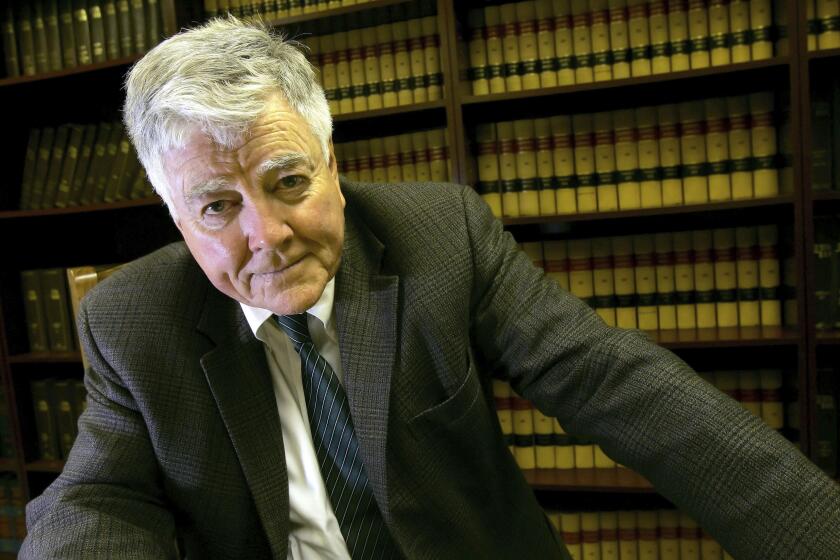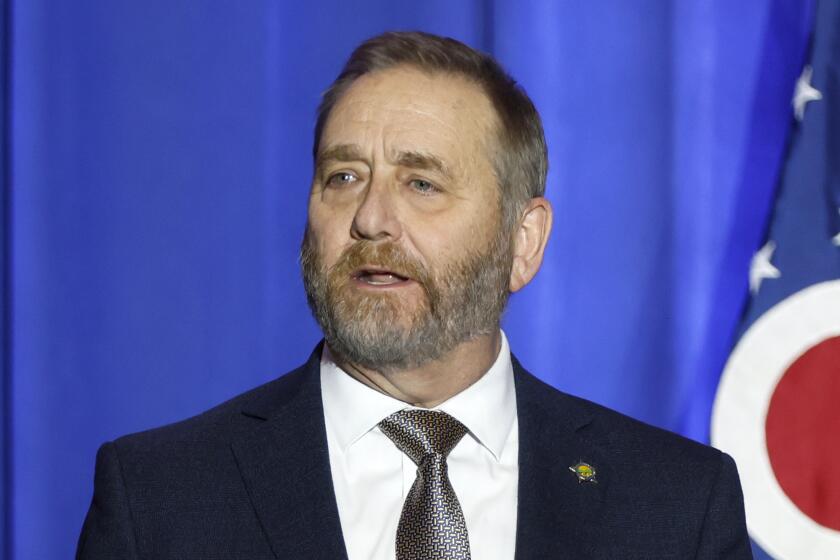U.S. Recalls Mideast Envoy Amid Violence
The U.S. government, alarmed at some of the worst Israeli-Palestinian violence in months, recalled its special Mideast envoy Saturday for consultations after his attempts to broker a cease-fire failed, while the Israeli army hunted the Gaza Strip for Palestinians suspected of terror activity.
Israeli armor and infantry killed five Palestinians in a daylong sweep through the northern Gaza Strip town of Beit Hanoun and in Rafah to the south. The dead included a 12-year-old boy, according to Palestinian officials, who said that more than 50 people were injured. Israeli forces arrested about 15 people before withdrawing Saturday evening.
A short time later, however, the army said Palestinian mortar fire had resumed, and Israeli helicopters returned to shell police posts near Beit Hanoun. No injuries were reported.
The recall of retired Marine Gen. Anthony C. Zinni scuttles the only ongoing truce mission and probably guarantees further escalation in bloodshed that has claimed more than 1,000 lives in less than 15 months--about 100 of them in the 20 days since Zinni’s arrival.
In addition to this intense surge in violence, Zinni, who represented the Bush administration’s first significant foray into Middle East peacemaking, repeatedly encountered obstacles in his meetings with Israeli and Palestinian leaders. He failed to prod Palestinian Authority President Yasser Arafat to crack down on Islamic radicals, and when Israeli Prime Minister Ariel Sharon said last week that his government would no longer deal with Arafat--not even with Zinni as go-between--the envoy’s mission seemed pointless.
After a series of deadly terror attacks on Israelis, the government severed all ties with Arafat, and the army has been pushing ever deeper into Palestinian territory while attacking the symbols of Arafat’s power. Israel said the raid into Gaza, like the ones in West Bank villages earlier in the week that left eight Palestinians dead, were aimed at fighting terrorism by rounding up the suspects Arafat won’t.
Additional raids on three Palestinian villages near the West Bank city of Jenin were reported in progress late Saturday.
In Gaza, as many as 35 tanks and armored personnel carriers took up positions at the northern, southern and eastern entrances to Beit Hanoun and along the town’s main street. The troops took over the town’s Secondary School for Girls, planting tanks and tents in the yard and hoisting the Israeli flag atop the buildings.
The Israeli army said its forces came under fire as they entered Beit Hanoun before dawn and shot back. Palestinian security officials said Israeli tanks backed by helicopter gunships entered firing. One policeman at his post was killed immediately, and four policemen patrolling in a car were injured by Israeli fire.
Later in the day, police and militiamen firing guns and youths throwing stones confronted the tanks at the entrance to Beit Hanoun. Clashes raged off and on for hours as Palestinians erected barricades and burned tires. Three more Palestinians--including the 12-year-old and a 16-year-old--were shot dead by Israeli fire, and dozens were wounded. No Israeli casualties were reported.
The Israeli army sealed off Gaza on Saturday and would not permit journalists to enter from Israel. However, journalists inside Gaza, including one working for The Times, provided detailed accounts of the day’s events.
As they took control of Beit Hanoun, which the army described as a bastion of the radical Islamic movement Hamas, soldiers used loudspeakers to warn people to remain in their homes. Then they began reading out names of men Israel accuses of being responsible for or participating in attacks on Israeli citizens and calling on them to surrender, witnesses said. That was followed by house-to-house searches and field interrogations by infantry units.
In the community’s Bora neighborhood, armored Israeli bulldozers and sappers using explosives demolished the home of Salah Shehada, a founder of Hamas who established its military wing in 1988. He served 12 years in an Israeli prison for his activities and was released a couple of months before the current intifada began in September 2000.
Shehada was not at home at the time of the raid.
The troops also converged on the home of another Hamas commander, Munir abu Odeh. His 22-year-old son, Tarik, jumped out of an upper-story window when soldiers burst into the house. From across the roadway, he said, he watched soldiers manhandle his 16-year-old brother and his mother, demanding to know where the elder Odeh was.
Like many Hamas militants, Odeh has been in hiding for days and does not spend time at the home--which the soldiers proceeded to demolish, Tarik Odeh said. Five houses, three security posts and a headquarters for Arafat’s Fatah movement were flattened, witnesses said.
The tanks then rumbled down the Gaza Strip’s main north-south road toward the town of Beit Lahiya and the teeming Jabaliya refugee camp but stopped short of entering both communities.
“We did not carry out this operation thinking it will put a complete stop to terror, but it definitely damaged the effectiveness,” Brig. Gen. Israel Ziv, the Israeli commander for Gaza, told reporters in a briefing on the edge of the Gaza Strip.
Hamas has claimed responsibility for many of suicide bombings in Israel. Israeli military sources said they believe Hamas and the equally radical Islamic Jihad are modeling themselves after the Lebanese Hezbollah, whose attacks on Israeli troops eventually forced the Jewish state to withdraw from southern Lebanon after about two decades.
A fifth Palestinian was killed Saturday in the southern Gaza Strip by the army, which said he had attempted to cut through the fence of a Jewish settlement. The army also said he possessed explosives.
And in a separate attack, a Palestinian suicide bomber blew himself up Saturday night at a soldiers’ crossing point on the border between Israel and the West Bank near the north-central town of Tulkarm. Except for the bomber, there were no casualties.
Palestinian security forces, meanwhile, shut down two newspapers belonging to Hamas and the Islamic Jihad, the editor of one of them, Al Risaleh (The Message), said Saturday.
His efforts futile, Zinni was returning to Washington to “provide an assessment to the president and Secretary [of State Colin L.] Powell of the situation in light of recent events and how best to proceed,” State Department spokesman Richard Boucher said in a statement.
He added that Zinni will “remain engaged and return to the region,” but did not say when.
White House Chief of Staff Andrew H. Card Jr. cast doubt on efforts to restart the process. “We would like to move forward with the peace process, but it’s not realistic today because the level of violence has increased dramatically over the last several months,” Card said.
More to Read
Start your day right
Sign up for Essential California for news, features and recommendations from the L.A. Times and beyond in your inbox six days a week.
You may occasionally receive promotional content from the Los Angeles Times.







